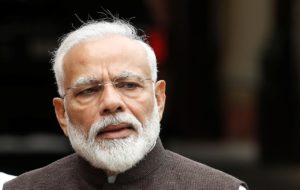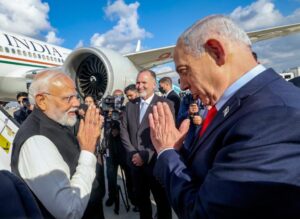Lessons On How To Fight For Peace In Middle East From MLK Jr.

U.S. President Lyndon B. Johnson, left, shakes hands with Martin Luther King Jr. after signing the Civil Rights Act on July 3, 1964, at the White House (AFP via Getty Images)
Since the onset of Israel’s deadly assault on Gaza and the West Bank after the Oct. 7, 2023, Hamas attack, debates have arisen among historians and media pundits about Martin Luther King (MLK) Jr.’s stance on Israel and its conflicts with Palestinians.
Some claim King was a fierce Zionist and point to his speech on Mar. 25, 1968, before the annual convention of the Rabbinical Assembly.
“Peace for Israel means security, and we must stand with all of our might to protect its right to exist, its territorial integrity,” King said. “I see Israel as one of the great outposts of democracy in the world, and a marvelous example of what can be done, how desert land almost can be transformed into an oasis of brotherhood and democracy.”
Others, like American-Israeli scholar Martin Kramer, have pointed to King’s views on Palestinian rights to their homeland. During a 1967 interview with ABC News, shortly after Israel launched the Six-Day War against Egypt, Syria and Jordan and seized control of land in Gaza and the West Bank, King said that Israel should return Palestinian lands.
“I think for the ultimate peace and security of the situation it will probably be necessary for Israel to give up this conquered territory, because to hold on to it will only exacerbate the tensions and deepen the bitterness of the Arabs,” he said.
As a scholar who researches social movements, racial politics and democracy, I believe there is a larger story beyond King’s stance on Israel and Palestinians. That story is on King’s views of war – and his courage to stand for peace.
This is the story of the anti-war King who understood that violence begets violence and that the political courage to speak for peace is essential to democracy.
Breaking His Silence
For King, joining the peace movement was tantamount to walking a political tightrope. On one hand, the Civil Rights Movement had a great supporter in U.S. President Lyndon B. Johnson, who signed the Civil Rights Act of 1964 and the Voting Rights Act of 1965.
But LBJ was also at the heart of the escalation of the war in Vietnam, and many believed King’s anti-war statements could and would be used against him.
The U.S. government’s hypocrisy in supporting the Vietnam War was not lost on King.
In 1965, 61% of Americans supported U.S. military involvement.
At the same time, King was asking hard questions about Johnson’s wartime decision-making and unmet promises of social uplift through his Great Society programs. King wondered how a nation could drop tons of bombs and napalm on civilians in the name of peace and freedom while violently subjugating its own Black citizens.
How could a nation spend so much money on a war, King asked, when it could not feed or protect its own people?
“The promises of the Great Society have been shot down on the battlefield of Vietnam,” King said in a speech in Beverly Hills on Feb. 25, 1967. “Billions are liberally expended for this ill-considered war. … The security we profess to seek in foreign adventures we will lose in our decaying cities. The bombs in Vietnam explode at home. They destroy the hopes and possibilities for a decent America.”
The Johnson administration argued that military force was essential to protect South Vietnam from the encroachment of communism from the north. As Johnson saw it, North Vietnam and its National Liberation Front were a threat to democracy in Southeast Asia.
King’s advisers pleaded with him not to speak out and argued that the political costs would be too high. Most importantly, they reminded King that there was more than enough work to do in the U.S. to end poverty and secure equal rights for Black citizens.
But King ultimately broke with his advisers and President Johnson.
By 1967, King followed the lead of his wife – and anti-war activist – Coretta Scott King and began speaking out.
In March 1967, King led his first anti-war march in Chicago. At the rally, he called on peace activists to organize “as effectively as the war hawks.”
A month later, on April 4, 1967, King gave the speech at the Riverside Church in New York City that changed the course of the last year of his life – “Beyond Vietnam − A Time to Break the Silence.” In that revolutionary speech, King described how he was morally compelled to speak out against the war.
In the days and weeks after, he would lose masses of supporters, Black and white alike. He lost hard-earned political allies, including President Johnson.
King was also shunned and denounced by 168 newspapers that questioned King’s failure to condemn the enemy, fueling long-standing rumors about communist ties.
Saving The Soul Of America
King had no regrets.
He understood the difficulty of speaking out against the war. “Even when pressed by the demands of inner truth, men do not easily assume the task of opposing their government’s policy, especially in time of war,” he said.
For King, a preacher at heart, silence had become betrayal.
Calling the U.S “the greatest purveyor of violence today,” King said the soul of America “can never be saved so long as it destroys the deepest hopes of men the world over.” He warned that America had lost moral authority abroad and derided “the deadly Western arrogance that has poisoned the international atmosphere for so long.”
King pointed to the role of the U.S. in prohibiting the realization of “a revolutionary government seeking self-determination” in Vietnam.
Most poignantly in that 1967 speech at Riverside Church, King detailed the devastating costs of the Vietnam War and described the millions of children and women who were killed by American bombs and bullets and the poor masses who were spared slaughter only to face a slow, painful death by disease and starvation.
Then King turned to the so-called “enemy,” the North Vietnamese. “Even if we do not condone their actions,” King said in the speech, “surely we must see that the men we supported pressed them to their violence. Surely we must see that our own computerized plans of destruction simply dwarf their greatest acts.”
Then King called for a cease-fire.
The Fight For Justice And Humanity
King’s words resonate today.
Unlike in King’s time, 61% of potential voters support a permanent cease-fire between Israel and Hamas. Anti-war protests abound across the nation and around the world.
How can the U.S., as King would ask the nation, move forward from here?
In the 1960s, King grappled with this very question. On the one hand, he felt a deep solidarity with the Jewish struggle against persecution, and on the other hand, he rejected the violent occupation of Palestinian lands that would run counter to the noble cause.
He saw resolution through a commitment to breaking cycles of violence and practicing radical peace, “a worldwide fellowship that lifts neighborly concern beyond one’s tribe, race, class, and nation.”
Nearly 60 years later, the fight for King’s “radical revolution of values,” where human life and dignity were the most valued, still rages. But as the life of King reminds us, speaking out for justice can be costly. Yet he would also say that the cost of remaining silent is far greater.
(Published under Creative Commons from The Conversation. Read the original article here)





